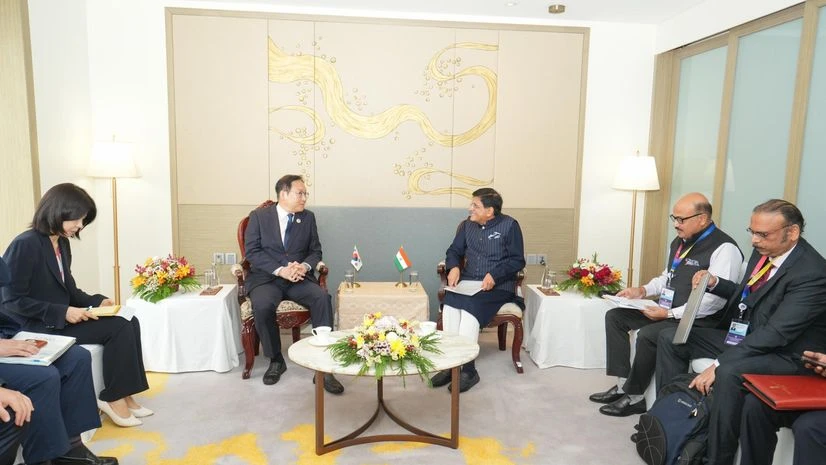)
Commerce and Industry Minister Piyush Goyal with his Korean counterpart Inkyo Cheong. Image: X@PiyushGoyal
India and Korea on Saturday held discussions on upgrading the existing free trade agreement, balancing two-way commerce and promoting investments between the two countries.
The issues were discussed during a meeting between Commerce and Industry Minister Piyush Goyal and his Korean counterpart Inkyo Cheong at Vientiane, Laos.
“Deliberations were held on achieving more balanced trade, upgrading the India-Korea Comprehensive Economic Partnership Agreement (CEPA), promoting investments linked to job creation and addressing non-tariff barriers to further strengthen our economic ties,” Goyal said in a post on social media platform X.
The two countries are holding review meetings to upgrade the CEPA, which was operationalised in January 2010. So far, over 10 rounds of review talks have been held.
The two countries have sought greater market access for certain products that are under the negative list of the agreement. No customs duty concessions are granted for the goods under this list.
Department of Commerce had earlier engaged with different ministries, including heavy industries, steel, and chemicals, to prepare the offer list.
India has sought greater market access for certain products like steel, rice, and shrimp from South Korea to boost exports of these goods. India has flagged issues over Korean firms not buying Indian steel.
The review exercise assumes significance as both sides have shared the hope that the CEPA upgradation negotiations would play an important role in strengthening and deepening the economic cooperation between both countries.
In general, such review or upgrade exercise includes implementation issues, rules of origin, verification process and release of consignments, customs procedures, further liberalisation of trade in goods, and sharing and exchange of trade data.
India has also raised concerns about the growing trade deficit between the two countries. India’s exports to Korea dipped to USD 6.41 billion in 2023-24 from USD 6.65 billion in 2022-23 and USD 8 billion in 2021-22.
The imports stood at USD 21.13 billion in the last fiscal as against USD 21.22 billion in 2022-23 and USD 17.5 billion in 2021-22.
According to economic think tank Global Trade Research Initiative (GTRI), India’s trade deficit with South Korea increased at a much higher rate compared to its trade deficit with the world.
It has also stated that Indian exporters are facing various non-tariff barriers in South Korea, including stringent standards, regulations, and certification requirements, and these barriers make it difficult for Indian goods to penetrate the South Korean market.
Goyal also held a meeting with Kan Zaw, Myanmar’s Minister of Investment and Foreign Economic Relations, on the sidelines of the 12th East Asia Summit Economic Ministers’ Meeting.
“Discussed potential cooperation in areas like lentils, diesel, gasoline, electric vehicles, etc and ways to promote bilateral trade including through Rupee-Kyat currency mechanism, between our nations,” he said.
(Only the headline and picture of this report may have been reworked by the Business Standard staff; the rest of the content is auto-generated from a syndicated feed.)
First Published: Sep 21 2024 | 1:27 PM IST


































